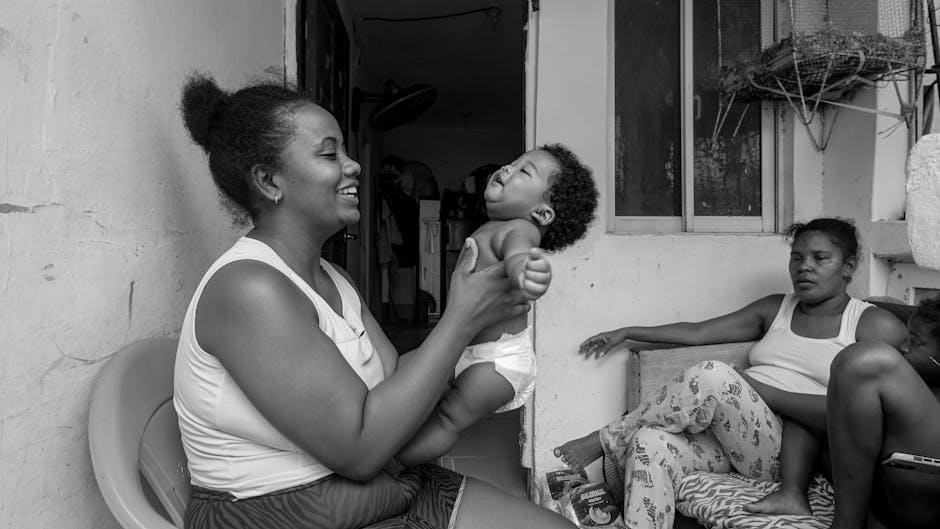
mother hunger pdf
Mother Hunger, introduced by Kelly McDaniel, describes an emotional void from maternal absence or neglect, leading to a deep yearning for care and love in adulthood.
1.1 Defining Mother Hunger
Mother Hunger, a term coined by Kelly McDaniel, describes a profound emotional void stemming from inadequate maternal care during formative years. It refers to the deep, unmet need for nurturance, protection, and guidance that arises when a child experiences maternal absence or neglect. This void can manifest as a lifelong yearning for connection and care, often impacting relationships, self-esteem, and emotional well-being in adulthood. McDaniel emphasizes that it is not about blaming mothers but recognizing the lasting effects of unaddressed relational trauma.
1.2 The Concept of Emotional Void
The emotional void in Mother Hunger arises from a lack of maternal connection, creating a deep sense of abandonment and disconnection. This void is not physical but emotional, stemming from unmet needs for love, security, and validation. It often results in feelings of emptiness, low self-worth, and difficulties in forming healthy relationships. Kelly McDaniel highlights how this void can manifest as a relentless search for fulfillment in other relationships, perpetuating a cycle of unmet emotional needs and inner pain throughout life.
1.3 The Role of Kelly McDaniel in Popularizing the Term
Kelly McDaniel is credited with popularizing the concept of Mother Hunger through her groundbreaking work. In her book, Ready to Heal, she introduced the term, describing it as an attachment injury stemming from maternal absence or neglect. Her second book, Mother Hunger, further explores this concept, offering tools for healing and sparking a movement among women seeking to address unresolved emotional wounds. McDaniel’s work has destigmatized the topic, providing a framework for understanding and overcoming the lasting effects of maternal deprivation.

Understanding the Causes of Mother Hunger
Mother Hunger stems from maternal absence or neglect, which can be physical or emotional, leading to emotional voids and attachment injuries. Childhood trauma and unmet primal needs play significant roles.
2.1 The Impact of Maternal Absence or Neglect
Maternal absence or neglect creates a profound emotional void, often stemming from physical or emotional disconnection. This absence disrupts the foundational bond, leaving a lasting impact on self-esteem and trust. It can manifest as feelings of abandonment or inadequacy, shaping adult relationships and behaviors. The lack of nurturing and protection during formative years contributes to this void, often leading to attachment injuries and a deep-seated yearning for maternal care. This unmet need profoundly affects emotional and relational well-being.
2.2 The Difference Between Physical and Emotional Disconnection
Physical disconnection refers to the mother’s literal absence, while emotional disconnection involves unavailability. Both create a void, but emotional disconnection often leaves deeper scars, as it involves a lack of responsiveness and empathy. This emotional absence can lead to feelings of isolation and low self-worth, affecting trust and intimacy in adult relationships. The distinction between these forms of disconnection helps understand the nuances of mother hunger and its lasting impact on emotional well-being and relational patterns.
2.3 The Role of Childhood Trauma
Childhood trauma significantly contributes to mother hunger, as inadequate nurturing and protection create emotional wounds. These unmet needs manifest as attachment injuries, affecting adult behavior and relationships. Kelly McDaniel emphasizes that childhood trauma disrupts the maternal bond, leading to a deep-seated yearning for care. Addressing these wounds is crucial for healing, as they often underlie destructive patterns and emotional struggles in later life. Recognizing the impact of childhood trauma is the first step toward breaking the cycle of mother hunger and reclaiming emotional well-being.

Signs and Symptoms of Mother Hunger
Signs of mother hunger include feelings of emptiness, low self-worth, and attachment issues. It may manifest as emotional dysregulation, people-pleasing, or unhealthy relationship patterns.
3.1 Emotional and Psychological Manifestations
Mother hunger often manifests as deep emotional pain, feelings of abandonment, and low self-worth. It can lead to anxiety, depression, and difficulty trusting others. Psychologically, it may result in self-doubt, fear of abandonment, and a persistent sense of emptiness. These emotional struggles stem from unmet childhood needs for nurturing and protection, creating a profound impact on mental health and relational dynamics in adulthood.
3.2 Behavioral Patterns in Adult Relationships
Adults with mother hunger often exhibit insecure attachment styles, seeking excessive care or becoming overly dependent in relationships. They may struggle with trust, fear abandonment, or attract emotionally unavailable partners. These patterns stem from unmet childhood needs, leading to repetitive cycles of disappointment and emotional distress. Such behaviors highlight the profound impact of early maternal disconnection on adult relational dynamics and emotional well-being.
3.4 The Role of Transference in Relationships
Transference plays a significant role in relationships affected by mother hunger, as individuals unconsciously seek the maternal bond they lacked in childhood. This often manifests as seeking excessive care or intimacy in partnerships, or even projecting unmet needs onto others. Such patterns can lead to repeated disappointment and emotional turmoil. Recognizing transference is crucial for breaking these cycles and fostering healthier relational dynamics, allowing individuals to address the root of their emotional yearning.

The Impact of Mother Hunger on Adult Life
Mother Hunger often manifests in adulthood through destructive behavior patterns, emotional turmoil, and strained relationships, highlighting the profound need for healing and self-awareness.
4.1 Effects on Romantic and Social Relationships
Mother Hunger often leads to emotional struggles in relationships, as unmet needs for maternal care can cause women to seek validation and connection in unhealthy ways. This may result in patterns of people-pleasing, fear of abandonment, or difficulty trusting others. Romantic relationships can become strained as unresolved wounds resurface, leading to emotional distance or intense attachment. Social interactions may also suffer, as feelings of insecurity or inadequacy persist, hindering the formation of fulfilling connections and reinforcing cycles of emotional pain.
4.2 The Connection to Destructive Behavior Patterns
Mother Hunger often manifests in destructive behavior patterns, such as self-sabotage, addiction, or unhealthy relationships, as women attempt to fill the emotional void left by unmet maternal needs. These behaviors stem from unresolved childhood trauma and a deep-seated longing for care and validation. The absence of nurturing can lead to self-destructive habits, as individuals may seek comfort in substances or harmful relationships to cope with feelings of abandonment and emotional pain, perpetuating a cycle of harm and disconnection.

4.3 The Role of Shame and Self-Blame
Mother Hunger often fosters deep-seated shame and self-blame, as women may internalize the lack of maternal care as a personal failing. This emotional burden can manifest as self-criticism, low self-worth, or feelings of being “not enough.” Shame arises from the belief that they were unworthy of love or attention, further exacerbating the emotional void. This self-blame can hinder relationships and personal growth, as it perpetuates a cycle of self-doubt and mistrust, making healing and connection challenging without proper intervention and self-compassion.
Healing from Mother Hunger
Healing from Mother Hunger involves recognizing the emotional void, addressing childhood trauma, and reconnecting with oneself through self-compassion and therapeutic tools, as guided by Kelly McDaniel.
5.1 Identifying and Acknowledging the Mother Wound
Identifying the mother wound involves recognizing the emotional void and relational injury caused by inadequate maternal care. Acknowledging this pain is the first step toward healing, allowing women to confront unresolved trauma and understand its impact on their lives. Self-compassion and acceptance are crucial in this process, as they enable individuals to address the deep-seated yearning for nurturance and guidance that was unmet in their formative years. This awareness paves the way for meaningful recovery and personal growth.
5.2 Therapeutic Interventions and Tools
Therapeutic interventions for mother hunger include professional therapy, guided exercises, and reflective practices. Tools like journaling and mindfulness help process unresolved trauma, fostering emotional awareness and healing. Kelly McDaniel’s work emphasizes the importance of therapeutic frameworks to address attachment injuries and rebuild self-worth. These interventions provide structured pathways to heal the mother wound, enabling individuals to reclaim their emotional well-being and develop healthier relationship patterns. They offer practical steps to bridge the gap left by inadequate maternal care.
5.3 The Importance of Self-Compassion and Reconnection
Self-compassion is crucial in healing from mother hunger, allowing individuals to replace self-blame with kindness and understanding. Reconnection involves rebuilding trust in oneself and others, fostering emotional resilience. Kelly McDaniel emphasizes the transformative power of self-care and self-compassion in mending the mother wound. By cultivating inner support, women can heal the void left by inadequate maternal care, leading to personal growth and healthier relationships. This process encourages self-forgiveness and reclaiming one’s emotional and psychological well-being.
The Role of Therapy and Support Systems
Therapy and support systems provide a safe space for healing, offering validation, guidance, and connection, essential for addressing and overcoming the emotional impacts of mother hunger.
6.1 The Value of Professional Guidance
Professional guidance is crucial in addressing mother hunger, offering specialized interventions and tools tailored to individual needs. Therapists trained in relational trauma work closely with clients to explore and heal deep-seated wounds. They provide a non-judgmental space to process emotions, identify patterns, and develop healthier attachment styles. With their expertise, clients can break free from destructive cycles and work toward emotional restoration and wholeness. This support is vital for lasting transformation and healing.
6.2 The Importance of Community and Shared Experiences
Community and shared experiences play a vital role in healing from mother hunger. Connecting with others who have similar journeys fosters understanding and validation. Shared spaces, whether through support groups or workshops, provide a platform to exchange stories and strategies. Kelly McDaniel emphasizes the power of collective healing, where women find strength in solidarity. These communities offer emotional support, reducing feelings of isolation and encouraging personal growth. They serve as a safe space for women to reconnect and find guidance. This collective approach accelerates the healing process.
Personal reflection and journaling are powerful tools for healing from mother hunger. These practices allow individuals to explore their emotions, identify patterns, and process unresolved wounds. Kelly McDaniel highlights the importance of self-awareness in breaking cycles of pain. Journaling provides a safe space to express feelings and gain clarity. Regular reflection fosters self-compassion and encourages personal growth. By documenting their journey, women can track progress and deepen their understanding of their experiences, aiding in the healing process and promoting emotional resilience. This introspective work is essential for long-term recovery.
6.3 The Role of Personal Reflection and Journaling
Personal reflection and journaling are vital for healing from mother hunger, offering a space to explore emotions, process wounds, and gain self-awareness. Kelly McDaniel emphasizes their importance in breaking pain cycles and fostering resilience. Journaling allows for honest expression and clarity, while reflection aids in understanding experiences. These practices promote self-compassion, track progress, and deepen emotional healing, guiding women toward recovery and personal growth with lasting impact.
7.1 Summarizing the Journey of Healing
Healing from mother hunger involves acknowledging the emotional void, understanding its roots in childhood, and embracing self-compassion. Kelly McDaniel guides women through this transformative process, emphasizing the importance of therapeutic tools and personal reflection. By addressing unresolved wounds and fostering resilience, individuals can break cycles of destructive behavior and rebuild their sense of self-worth. The journey encourages reconnecting with one’s needs, reclaiming lost experiences, and finding guidance from supportive relationships, ultimately leading to profound emotional and relational healing.
7.2 Encouraging Further Exploration and Growth
Exploring mother hunger further invites women to deepen their understanding of unresolved wounds and their impact on adult life. Kelly McDaniel’s resources, including her book and supplemental materials, offer practical tools for continued growth. Engaging with supportive communities and seeking professional guidance can enhance the healing journey. Encouraging self-reflection and curiosity empowers women to reclaim their narratives, fostering resilience and personal transformation. This ongoing process nurtures emotional healing and promotes a more fulfilling, authentic life.
Related Posts

tuya smart lock manual pdf
Need help setting up your Tuya smart lock? Find the official manual in PDF format here! Easy-to-follow instructions & troubleshooting for a secure home. **Tuya Smart Lock** made simple.

code talker book pdf
Download the gripping ‘Code Talker’ book PDF! Explore the incredible true story of Navajo Marines in WWII. A must-read for history buffs & anyone seeking inspiring tales. Get your copy now!

linux kali pdf
Need a quick reference for Kali Linux & PDFs? This guide covers essential commands, security tips, and PDF analysis techniques. Master your digital forensics skills now!